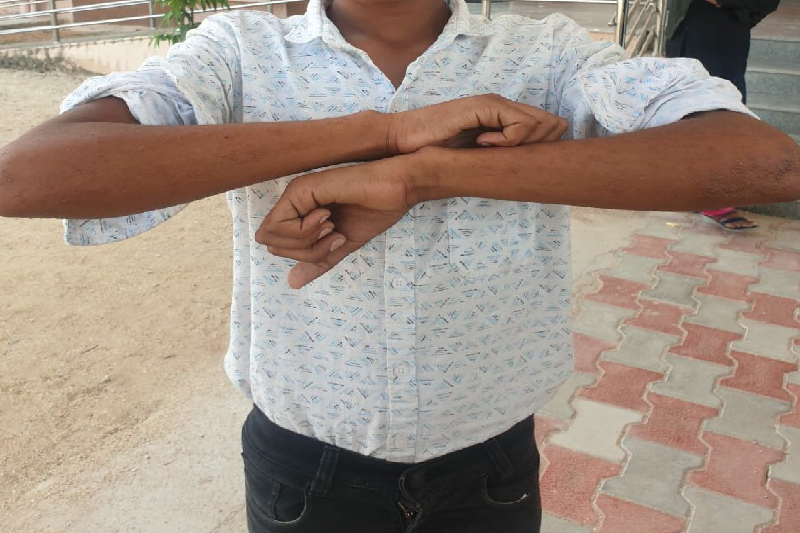
Skin Infection Concerns Spark Hygiene Drive in Karnataka’s Government Residential Schools
Rising Health Concerns in KREIS Schools
A recent spurt of skin infections among students in Karnataka’s government-run residential schools has raised alarms and prompted immediate action from the Karnataka Residential Educational Institutions Society (KREIS). These 821 schools provide free residential education to students from Classes 6 to 12, mostly from disadvantaged backgrounds. The health scare has highlighted the urgent need for stricter hygiene measures and regular medical monitoring in residential school environments.
Cases Reported from Chikkaballapur District
Over the past few months, scattered cases of skin irritation have surfaced in different districts, with the latest reports coming from two residential schools in Chikkaballapur district. Children, especially those with sensitive skin, complained of itching on their hands and legs. Though the cases were not severe, the concentration of 250 students in each school heightened concerns about potential spread.
Kantharaju P.S., Executive Director of KREIS, explained:
“Although we have not seen any serious conditions, some children complained of itching. We have staff nurses in place, and they immediately coordinated with doctors in nearby primary health centres (PHCs) to ensure the children received treatment.”
Hygiene Challenges Among Children
Officials attributed the skin infections primarily to poor personal hygiene. Many students struggle with maintaining cleanliness in hostels, often neglecting to wash properly after playing outdoors or failing to keep their bedding clean. While such lapses may seem minor, they can become infections in shared living spaces.
Kantharaju stressed that most complaints arose from students with sensitive skin. “As they are kids, they often forget basic hygiene practices. We are addressing this by actively monitoring and guiding them,” he said.
Appointing Hygiene Guides in Schools
To tackle the issue systematically, KREIS has mandated that every school appoint one teacher or staff member for every 20–25 students as a “master guide.” These guides will ensure that children practice hygiene diligently in their daily routines.
A circular has been sent to all residential schools directing strict adherence to hygiene protocols. Combined with timely medical intervention and regular check-ups, KREIS hopes to curb the recurrence of skin-related issues among hostel students.
Joint House Committee Recommendations
The recent developments also caught the attention of the joint house committee, which reviewed health standards in residential schools. Its report highlighted that children in these institutions are more vulnerable to dermatological issues such as fungal infections, scabies, and eczema.
To address this, the committee recommended that the Department of Health and Family Welfare Services (DHFWS) conduct dermatological check-ups at least two to three times a year across all government residential schools. It also stressed the importance of supplying necessary medicines in time to prevent outbreaks.
Role of the Health Department
Officials from DHFWS, who already carry out check-ups in schools under the Rashtriya Bal Swasthya Karyakram (RBSK), confirmed that skin-related health conditions are common among hostel children. Harsh Gupta, Principal Secretary to the Government, DHFWS, explained:
“These issues often occur due to unhygienic environments and nutritional deficiencies in hostels. We are working on solutions to address these challenges.”
The department acknowledged that fungal infections, scabies, and eczema were the most common conditions detected during medical screenings.
KREIS Response to Allegations
While DHFWS flagged the seriousness of the issue, KREIS officials offered a different perspective. Kantharaju denied that the children developed rashes, which are considered primary symptoms of scabies and eczema. He clarified that the cases were mainly limited to itching without more severe symptoms.
According to KREIS, this distinction indicates that while hygiene remains a pressing concern, the infections may not be as severe as suggested. Nevertheless, the organisation has adopted a preventive approach to ensure student safety and well-being.
Importance of Preventive Hygiene Education
Experts believe that preventive education is key in residential schools beyond medical intervention. With hundreds of children living in close quarters, one student’s lapse in cleanliness can quickly impact others. Teaching children the importance of washing hands and legs, keeping beds clean, and maintaining personal hygiene can go a long way in reducing recurring health issues.
Balancing Education and Health in Residential Schools
KREIS schools are crucial in providing free, quality education to underprivileged children. For many of these students, the hostels represent not just a learning environment but also a home. Ensuring their health and well-being is inseparable from their educational progress.
The current hygiene drive and the push for more frequent medical check-ups are steps in the right direction. By integrating health awareness into daily routines, Karnataka’s residential schools can set a precedent for safe and healthy learning environments across India.
Looking Ahead
The fear of skin infection has underscored the pressing need for long-term strategies in health management within residential schools. Coordination between KREIS, DHFWS, and school staff will be essential in creating sustainable hygiene practices.
As Kantharaju noted, a combination of guided supervision, timely treatment, and regular monitoring can help prevent the spread of skin infections. Ultimately, ensuring good health among hostel students is not just a matter of disease prevention—it is about enabling children to learn, grow, and thrive in a safe environment.



